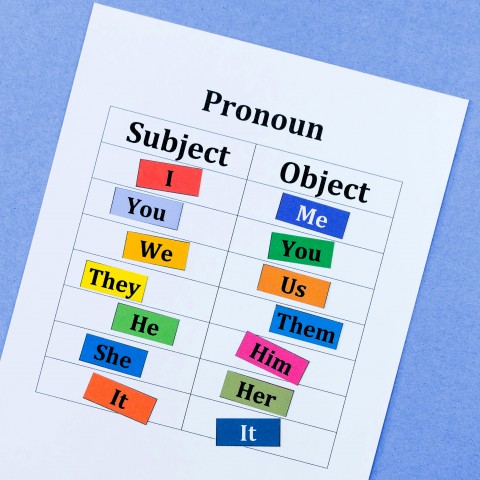
So, you’ve just started learning Hungarian. Congratulations!
Are you feeling excited? Confident? Or maybe a bit nervous and overwhelmed?
That would be entirely understandable. When you decide to pick up a foreign language, it can be difficult to know where you should start.
But luckily for you, HungarianPod101.com has your back!
In this article, you’ll find 200+ basic Hungarian words for beginners. Memorizing these words will give you a solid vocabulary base to build upon, which will be super-important once you start trying to form sentences.
We’ve collected only the most common Hungarian words for beginners, so you won’t have to bother with words that are too advanced or not very useful. We’ve even categorized them to make your studying process even smoother. Below, you’ll find all of the Hungarian vocabulary basics: pronouns, numbers, nouns, adjectives, and conjunctions.
Let’s get right to it, then!

 Table of Contents
Table of Contents
- Pronouns
- Numbers
- Nouns
- Verbs
- Adjectives
- Conjunctions
- Other Hungarian Beginner Words
- How HungarianPod101.com Helps You Reach Your Hungarian Learning Goals
1. Pronouns
The first set of Hungarian beginner words you should study are the pronouns. You’ll need these little words in order to form just about any sentence, so let’s kick off our list with these essential Hungarian words.
Pronouns can be used to represent a subject or an object within a sentence, and different types of pronouns are used for different purposes. Here, we’re going to introduce the personal (nominative + accusative), demonstrative, and interrogative pronouns.
- → By the way, make sure you check out our article about pronouns for more information on how to use them!
Personal Pronouns (Nominative)
| English | Hungarian |
| I | Én |
| You [singular] | Te |
| He / She / It | Ő / Az |
| We | Mi |
| You [plural] | Ti |
| They | Ők |
Example:
- Mi sosem alszunk. – “We never sleep.”
Personal Pronouns (Accusative)
| English | Hungarian |
| Me | Engem |
| You [singular] | Téged |
| Him / Her / It | Őt / Azt |
| Us | Minket / Bennünket |
| You [plural] | Titeket / Benneteket |
| Them | Őket |
Example:
- Szeretném (őt) randira hívni. – “I would like to ask her on a date.”
Demonstrative Pronouns
| English | Hungarian |
| This | Ez |
| That | Az |
| These | Ezek |
| Those | Azok |
Example:
- Azok a macskák nagyon aranyosak. – “Those cats are really cute.”
Interrogative Pronouns / Question Words
| English | Hungarian |
| What | Mi |
| Who | Ki |
| To whom | Kinek |
| Why | Miért |
| Where | Hol |
| When | Mikor |
| For what | Minek |
Example:
- Ki mondta ezt neked? – “Who told you this?”

2. Numbers
Another important aspect of the Hungarian language for beginners to grasp is the number system. Thankfully, numbers in Hungarian are not as difficult as those in French, for example, where eighty is expressed as “four times twenty.”
We’ve listed the numbers 1-10 in Hungarian below. If you want to learn even more numbers along with their pronunciation, you can check out our Numbers vocabulary list.
“One” – Egy “Six” – Hat
“Two” – Kettő “Seven” – Hét
“Three” – Három “Eight” – Nyolc
“Four” – Négy “Nine” – Kilenc
“Five” – Öt “Ten” – Tíz

3. Nouns
Once you have the pronouns and numbers down, you should focus your attention on memorizing as many nouns as possible. Below, we’ve listed several Hungarian nouns for beginners and categorized them according to topic; you’ll find frequently used words for family, work, and more! Learning these will give you a strong vocabulary base and prepare you to start forming basic sentences.
Family
“Mom” – Anya “Grandparent” – Nagyszülő
“Dad” – Apa “Grandma” – Nagymama / Nagyi
“Sibling” – Testvér “Grandpa” – Nagypapa / Papó
“Sister” – Lánytestvér “Uncle” – Nagybácsi
“Little sister” – Húg
“Big sister” – Nővér
“Brother” – Fiútestvér
“Little brother” – Öccs
“Big brother” – Báty “Aunt” – Nagynéni
“Cousin” – Unokatestvér “Godparent” – Keresztszülő
Occupations
“Police officer” – Rendőr “Teacher” – Tanár
“Fireman” – Tűzoltó “Translator” – Fordító
“Cook” – Szakács “Interpreter” – Tolmács
“Engineer” – Mérnök “Locksmith” – Lakatos
“Doctor” – Orvos / Doktor “Painter” – Festő

Places Around Town
“Hospital” – Kórház “Hair salon” – Fodrászat
“School” – Iskola “Beauty salon” – Kozmetika
“Kindergarten” – Óvoda “Bank” – Bank
“Library” – Könyvtár “Pharmacy” – Gyógyszertár
“Supermarket” – Szupermarket “Market” – Piac
“Bakery” – Pékség “Restaurant” – Étterem
“Bus station” – Buszállomás “Police station” – Rendőrség
School/Office Essentials
“Pen” – Toll “Rubber” – Radír
“Pencil” – Ceruza “Sharpener” – Hegyező
“Paper” – Papír “Ruler” – Vonalzó
“Stapler” – Tűzőgép “Glue” – Ragasztó
“Notebook” – Jegyzetfüzet “Sellotape” – Cellux (szalag)
“Folder” – Dosszié “Computer” – Számítógép
“Student book” – Tankönyv “Laptop” – Laptop
“Exercise book” – Munkafüzet “Printer” – Nyomtató
“Pencil case” – Tolltartó “File cabinet” – Iratszekrény
“Highlighter” – Szövegkiemelő “Paper shredder” – Iratmegsemmisítő
Body Parts
“Head” – Fej “Eye” – Szem
“Neck” – Nyak “Eyebrow” – Szemöldök
“Body” – Test “Eyelash” – Szempilla
“Torso” – Törzs “Nose” – Orr
“Leg” – Láb “Mouth” – Száj
“Arm” – Kar “Tooth” – Fog
“Hand” – Kéz “Lip” – Ajak
“Finger” – Ujj “Chin” – Áll
“Toe” – Lábujj “Ear” – Fül
And a couple of cheeky ones:
“Butt” – Fenék “Boob” – Mell
Food
“Vegetable” – Zöldség “Fruit” – Gyümölcs
“Carrot” – Répa “Blueberry” – Áfonya
“Tomato” – Paradicsom “Strawberry” – Eper
“Potato” – Krumpli / Burgonya “Orange” – Narancs
“Salad” – Saláta “Lemon” – Citrom
“Cabbage” – Káposzta “Banana” – Banán
- → Click for more beginner Hungarian words for vegetables and fruits.
“Milk” – Tej “Egg” – Tojás
“Tea” – Tea “Yogurt” – Joghurt
“Water” – Víz “Cheese” – Sajt
“Cocoa” – Kakaó “Oat” – Zab
“Chicken” – Csirke “Pork” – Sertés
“Lamb” – Bárány “Duck” – Kacsa
“Beef” – Marha “Fish” – Hal
“Salmon” – Lazac “Shrimp” – Garnéla(rák)
- → Check out what Hungarian grocery shopping would look—and sound—like.

4. Verbs
Verbs are another essential set of Hungarian beginner words to pick up early on. They serve a vital function in sentences, so we’ve made sure to include only the most useful verbs on our list. Below, the verbs are divided into two categories: 1) verbs you might use to describe your daily routine, and 2) other common verbs you should learn as a beginner in Hungarian.
Daily Routine
“Wake up” – Felébredni “Work” – Dolgozni
“Get up” – Felkelni “Study” – Tanulni
“Brush teeth” – Fogat mosni “Drive” – Vezetni
“Have breakfast” – Reggelizni “Travel” – Utazni
“Have lunch” – Ebédelni “Wash hands” – Kezet mosni
“Have dinner” – Vacsorázni “Commute” – Ingázni
“Get ready” – Elkészülni “Pay” – Fizetni
“Get dressed” – Felöltözni “Buy” – Vásárolni / Venni
“Eat” – Enni “Greet” – Üdvözölni
“Drink” – Inni “Talk” – Beszélni
“Go” – Menni “Have a conversation” – Beszélgetni
“Come” – Jönni “Shake hands” – Kezetrázni
- → Wondering how to use these words in sentences? Follow along with a small dialogue about a Hungarian person’s daily grind.
Other Common Verbs
“Give” – Adni “Speak” – Beszélni
“Get” / “Receive” – Kapni “Cry” – Sírni
“Do” – Csinálni “Bake” – Sütni
“Make” – Készíteni “Cook” – Főzni
“Let” – Hagyni “Learn” – Tanulni
“Ask” – Kérdezni “Wait” – Várni
“Answer” – Válaszolni “Queue” – Sorban állni
“Search” – Keresni “Wave” – Integetni
“Find” – Találni “Nod” – Bólintani
“Smile” – Mosolyogni “Love” – Imádni
“Laugh” – Nevetni “Like” – Szeretni
“Laugh out loud” – Röhögni “Hate” – Utálni

5. Adjectives
Even though adjectives are not required in a sentence, grammatically speaking, it’s nice to know some of them in case you ever want to describe something.
For example, let’s say you meet a beautiful girl or a handsome guy at a bar in Hungary. Well, what would you say to them if you had no adjectives to fall back on? Tough question, right? Well, no need to worry, because we have got you covered.
Below, you’ll find the most practical adjectives in Hungarian for beginners. These words are commonly used amongst Hungarians and are rather simple to pick up, so you’ll have little problem composing basic sentences. Who knows? Maybe you’ll even make that person you laid eyes on swoon. 😉
Describing Objects
“Big” – Nagy “Thick” – Vastag
“Small” – Kicsi “Thin” – Vékony
“Long” – Hosszú “Sharp” – Éles
“Short” – Rövid “Hard” – Kemény
“Medium” – Közepes “Soft” – Puha
Describing People
“Pretty” – Csinos “Slim” – Vékony
“Handsome” – Helyes / Jóképű “Obese” – Túlsúlyos
“Stylish” – Divatos “Kind” – Kedves
“Tall” – Magas “Smart” – Okos
“Short” – Alacsony “Silly” – Buta
- → Did csinos or helyes land you a date? Then check out our list of common phrases in Hungarian you’ll need for a date—you’re welcome.
Describing Emotions
“Happy” – Boldog “Scared” – Ijedt
“Sad” – Szomorú “Tired” – Fáradt
“Excited” – Izgatott “Longing” – Vágyakozó
“Indifferent” – Közömbös “Hopeful” – Reménykedő
“Angry” – Mérges “Disgusted” – Undorodó
- → Test your knowledge. Try a Quizlet for Hungarian emotions.
Describing the Weather
“Sunny” – Napos “Windy” – Szeles
“Rainy” – Esős “Cloudy” – Felhős
“Hot” – Forró “Foggy” – Ködös
“Warm” – Meleg “Stormy” – Viharos
“Cold” – Hideg “Clear” – Tiszta

6. Conjunctions
Conjunctions are a crucial part of any language, serving to connect two or more words, phrases, or sentences (both grammatically and logically). These essential Hungarian beginner words will help the listener better comprehend your message by allowing them to see the connections between different points.
“And” – És “So” – Szóval
“But” – De “After” – Miután
“Although” – Ám / Azonban “Even though” – Habár
“Then” – Aztán “Lest” – Nehogy
“Because” – Mert “Nor” – Sem
7. Other Hungarian Beginner Words
Last but not least, auxiliaries are another key set of words that Hungarian beginners should learn early on. See the examples below for a better idea of what they are and how they’re used.
“Will” – Fog ➤ “I will tell you.” – El fogom mondani neked.
“Dare” – Mer ➤ “I dare to tell you.” – El merem mondani neked.
“May” – Szabad ➤ “I may tell you.” – El szabad mondanom neked.
“Have to” – Kell ➤ “I have to tell you.” – El kell mondanom neked.
“Can” – Tud ➤ “I can tell you.” – El tudom mondani neked.
“Manage” – Sikerül ➤ “I managed to tell you.” – El sikerült mondanom neked.
8. How HungarianPod101.com Helps You Reach Your Hungarian Learning Goals
If you’ve made it this far, it means you’ve familiarized yourself with the most useful Hungarian beginner words. By now, you probably know…
- …personal and demonstrative pronouns.
- …how to count to (at least) ten.
- …the most basic nouns, verbs, and adjectives in a variety of categories.
- …the most important conjunctions and auxiliaries for conversations.
How many of these words were new to you? Did you know some of them already? Let us know in the comments!
If you found this list a bit overwhelming, it’s nothing to be ashamed or discouraged about. The most important thing is to keep practicing until it sticks!
This is where HungarianPod101 comes in.
We provide a range of study materials and practical exercises for learners, including an entire series of Hungarian lessons for beginners. You’ll also find free vocabulary lists, a Hungarian dictionary, a voice recording tool, and much more! When you become a member, you not only gain access to some of the best Hungarian language learning resources on the web, but you also join an entire community of dedicated teachers and other learners like yourself.
If you’re thirsty for more, let us know in the comments so that we can address the issue in our next article. And in the meantime, continue exploring our website or take some time to click through the educational links throughout this article.
What are you waiting for? Join now.










